Vera & Siddo: A Case Study on Commercial and Legal Aspects of Agency
VerifiedAdded on 2020/04/07
|9
|3036
|107
Case Study
AI Summary
This case study delves into the application of agency law within a commercial context, specifically analyzing the relationship between Vera (the principal) and Siddo (the agent). It examines the creation of agency, whether express or implied, and explores the concept of ratification when an agent acts outside the scope of their authority. The analysis further investigates potential breaches of contract, the availability of remedies for the principal, including claims for damages and recovery of secret profits, and the implications of undisclosed principals. The study references relevant case laws and statutes to support its arguments, providing a comprehensive overview of the legal issues at play in the scenario. Desklib provides students with access to similar case studies, solved assignments, and past papers for academic support.
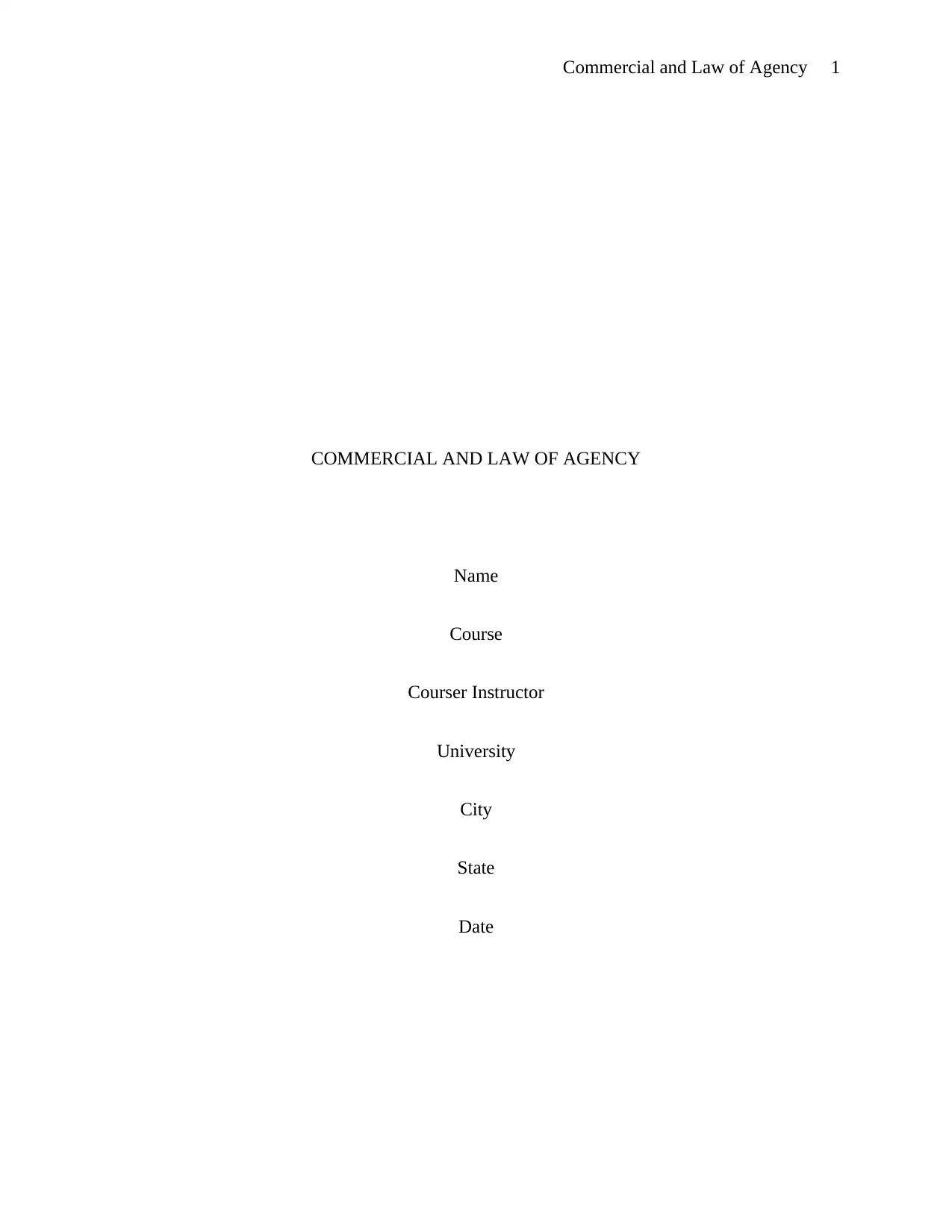
Commercial and Law of Agency 1
COMMERCIAL AND LAW OF AGENCY
Name
Course
Courser Instructor
University
City
State
Date
COMMERCIAL AND LAW OF AGENCY
Name
Course
Courser Instructor
University
City
State
Date
Paraphrase This Document
Need a fresh take? Get an instant paraphrase of this document with our AI Paraphraser
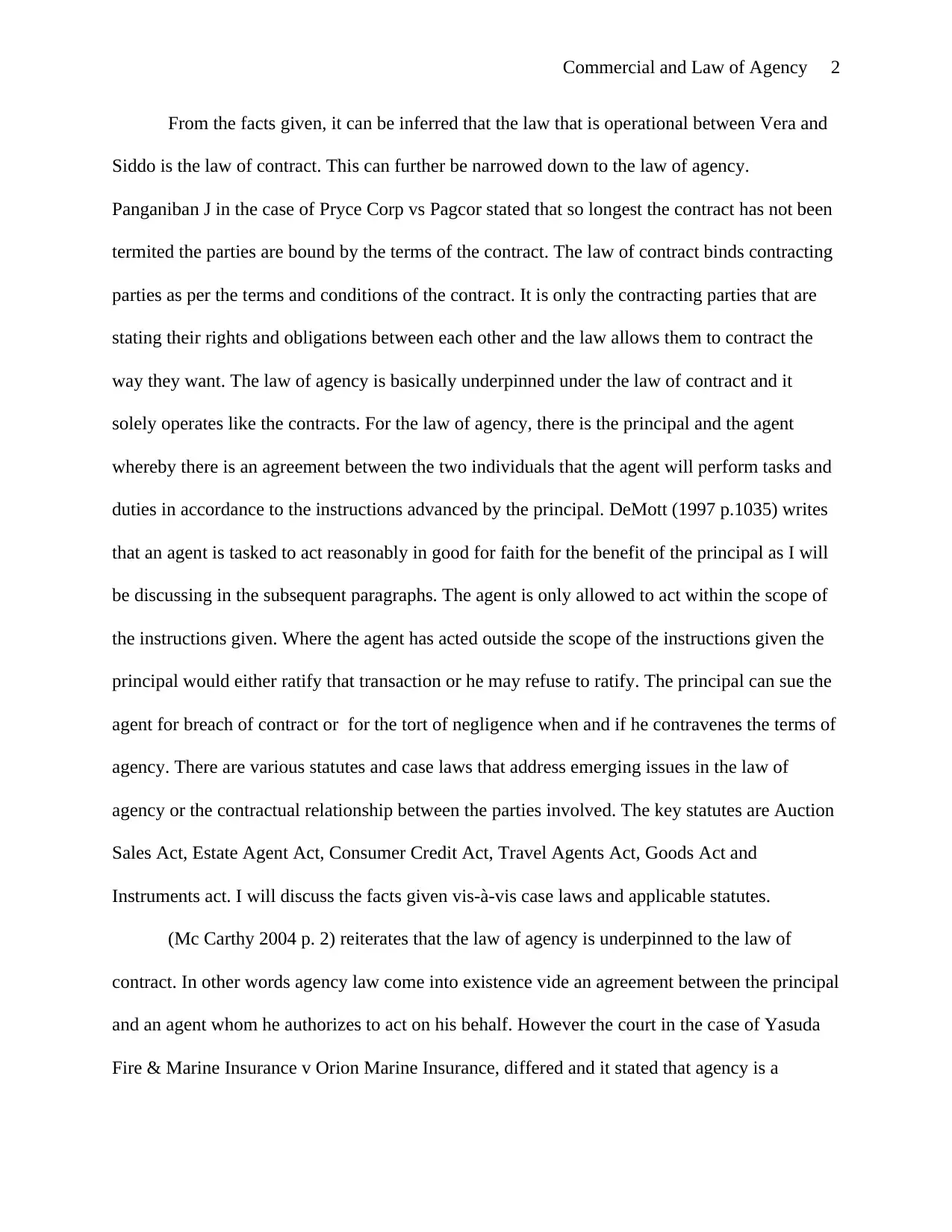
Commercial and Law of Agency 2
From the facts given, it can be inferred that the law that is operational between Vera and
Siddo is the law of contract. This can further be narrowed down to the law of agency.
Panganiban J in the case of Pryce Corp vs Pagcor stated that so longest the contract has not been
termited the parties are bound by the terms of the contract. The law of contract binds contracting
parties as per the terms and conditions of the contract. It is only the contracting parties that are
stating their rights and obligations between each other and the law allows them to contract the
way they want. The law of agency is basically underpinned under the law of contract and it
solely operates like the contracts. For the law of agency, there is the principal and the agent
whereby there is an agreement between the two individuals that the agent will perform tasks and
duties in accordance to the instructions advanced by the principal. DeMott (1997 p.1035) writes
that an agent is tasked to act reasonably in good for faith for the benefit of the principal as I will
be discussing in the subsequent paragraphs. The agent is only allowed to act within the scope of
the instructions given. Where the agent has acted outside the scope of the instructions given the
principal would either ratify that transaction or he may refuse to ratify. The principal can sue the
agent for breach of contract or for the tort of negligence when and if he contravenes the terms of
agency. There are various statutes and case laws that address emerging issues in the law of
agency or the contractual relationship between the parties involved. The key statutes are Auction
Sales Act, Estate Agent Act, Consumer Credit Act, Travel Agents Act, Goods Act and
Instruments act. I will discuss the facts given vis-à-vis case laws and applicable statutes.
(Mc Carthy 2004 p. 2) reiterates that the law of agency is underpinned to the law of
contract. In other words agency law come into existence vide an agreement between the principal
and an agent whom he authorizes to act on his behalf. However the court in the case of Yasuda
Fire & Marine Insurance v Orion Marine Insurance, differed and it stated that agency is a
From the facts given, it can be inferred that the law that is operational between Vera and
Siddo is the law of contract. This can further be narrowed down to the law of agency.
Panganiban J in the case of Pryce Corp vs Pagcor stated that so longest the contract has not been
termited the parties are bound by the terms of the contract. The law of contract binds contracting
parties as per the terms and conditions of the contract. It is only the contracting parties that are
stating their rights and obligations between each other and the law allows them to contract the
way they want. The law of agency is basically underpinned under the law of contract and it
solely operates like the contracts. For the law of agency, there is the principal and the agent
whereby there is an agreement between the two individuals that the agent will perform tasks and
duties in accordance to the instructions advanced by the principal. DeMott (1997 p.1035) writes
that an agent is tasked to act reasonably in good for faith for the benefit of the principal as I will
be discussing in the subsequent paragraphs. The agent is only allowed to act within the scope of
the instructions given. Where the agent has acted outside the scope of the instructions given the
principal would either ratify that transaction or he may refuse to ratify. The principal can sue the
agent for breach of contract or for the tort of negligence when and if he contravenes the terms of
agency. There are various statutes and case laws that address emerging issues in the law of
agency or the contractual relationship between the parties involved. The key statutes are Auction
Sales Act, Estate Agent Act, Consumer Credit Act, Travel Agents Act, Goods Act and
Instruments act. I will discuss the facts given vis-à-vis case laws and applicable statutes.
(Mc Carthy 2004 p. 2) reiterates that the law of agency is underpinned to the law of
contract. In other words agency law come into existence vide an agreement between the principal
and an agent whom he authorizes to act on his behalf. However the court in the case of Yasuda
Fire & Marine Insurance v Orion Marine Insurance, differed and it stated that agency is a
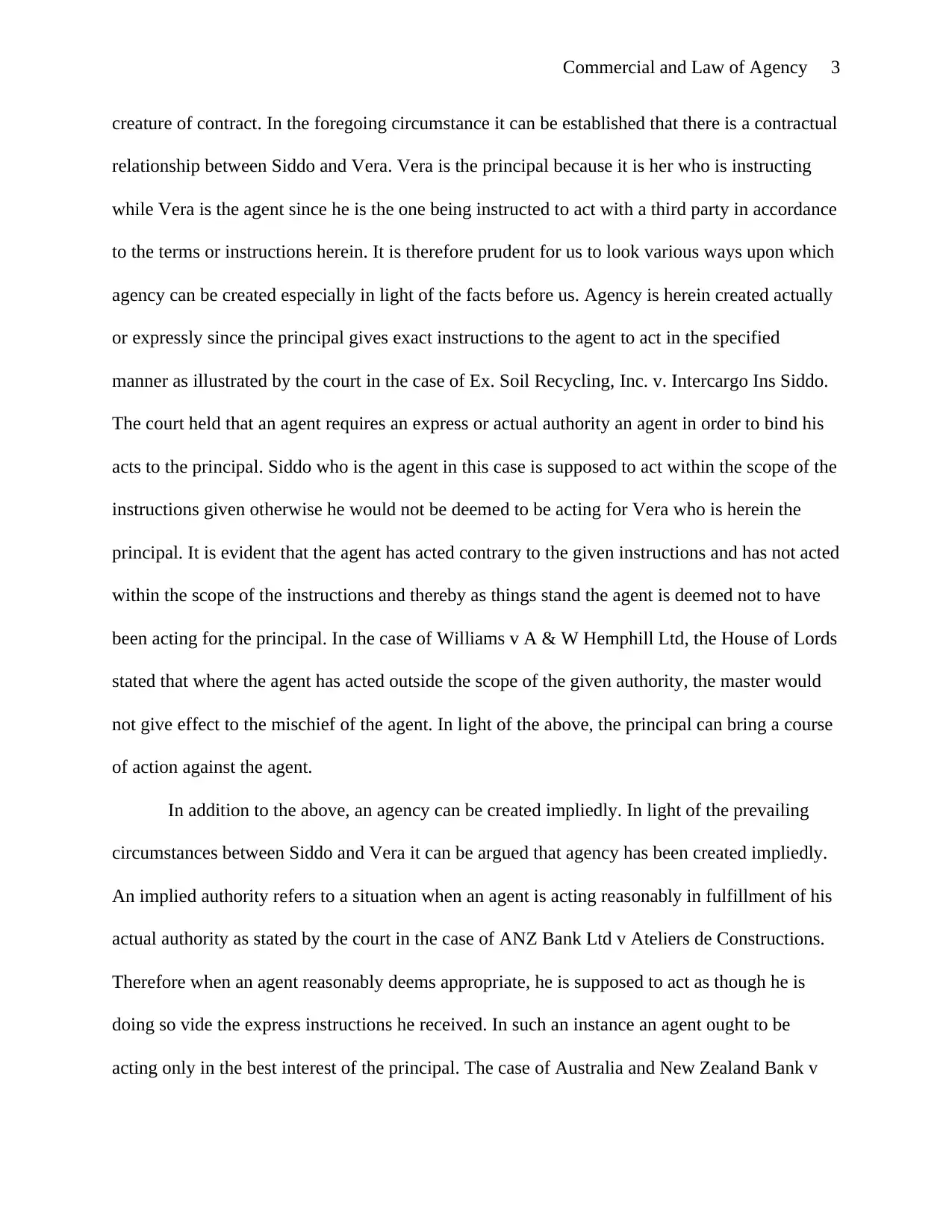
Commercial and Law of Agency 3
creature of contract. In the foregoing circumstance it can be established that there is a contractual
relationship between Siddo and Vera. Vera is the principal because it is her who is instructing
while Vera is the agent since he is the one being instructed to act with a third party in accordance
to the terms or instructions herein. It is therefore prudent for us to look various ways upon which
agency can be created especially in light of the facts before us. Agency is herein created actually
or expressly since the principal gives exact instructions to the agent to act in the specified
manner as illustrated by the court in the case of Ex. Soil Recycling, Inc. v. Intercargo Ins Siddo.
The court held that an agent requires an express or actual authority an agent in order to bind his
acts to the principal. Siddo who is the agent in this case is supposed to act within the scope of the
instructions given otherwise he would not be deemed to be acting for Vera who is herein the
principal. It is evident that the agent has acted contrary to the given instructions and has not acted
within the scope of the instructions and thereby as things stand the agent is deemed not to have
been acting for the principal. In the case of Williams v A & W Hemphill Ltd, the House of Lords
stated that where the agent has acted outside the scope of the given authority, the master would
not give effect to the mischief of the agent. In light of the above, the principal can bring a course
of action against the agent.
In addition to the above, an agency can be created impliedly. In light of the prevailing
circumstances between Siddo and Vera it can be argued that agency has been created impliedly.
An implied authority refers to a situation when an agent is acting reasonably in fulfillment of his
actual authority as stated by the court in the case of ANZ Bank Ltd v Ateliers de Constructions.
Therefore when an agent reasonably deems appropriate, he is supposed to act as though he is
doing so vide the express instructions he received. In such an instance an agent ought to be
acting only in the best interest of the principal. The case of Australia and New Zealand Bank v
creature of contract. In the foregoing circumstance it can be established that there is a contractual
relationship between Siddo and Vera. Vera is the principal because it is her who is instructing
while Vera is the agent since he is the one being instructed to act with a third party in accordance
to the terms or instructions herein. It is therefore prudent for us to look various ways upon which
agency can be created especially in light of the facts before us. Agency is herein created actually
or expressly since the principal gives exact instructions to the agent to act in the specified
manner as illustrated by the court in the case of Ex. Soil Recycling, Inc. v. Intercargo Ins Siddo.
The court held that an agent requires an express or actual authority an agent in order to bind his
acts to the principal. Siddo who is the agent in this case is supposed to act within the scope of the
instructions given otherwise he would not be deemed to be acting for Vera who is herein the
principal. It is evident that the agent has acted contrary to the given instructions and has not acted
within the scope of the instructions and thereby as things stand the agent is deemed not to have
been acting for the principal. In the case of Williams v A & W Hemphill Ltd, the House of Lords
stated that where the agent has acted outside the scope of the given authority, the master would
not give effect to the mischief of the agent. In light of the above, the principal can bring a course
of action against the agent.
In addition to the above, an agency can be created impliedly. In light of the prevailing
circumstances between Siddo and Vera it can be argued that agency has been created impliedly.
An implied authority refers to a situation when an agent is acting reasonably in fulfillment of his
actual authority as stated by the court in the case of ANZ Bank Ltd v Ateliers de Constructions.
Therefore when an agent reasonably deems appropriate, he is supposed to act as though he is
doing so vide the express instructions he received. In such an instance an agent ought to be
acting only in the best interest of the principal. The case of Australia and New Zealand Bank v
⊘ This is a preview!⊘
Do you want full access?
Subscribe today to unlock all pages.

Trusted by 1+ million students worldwide
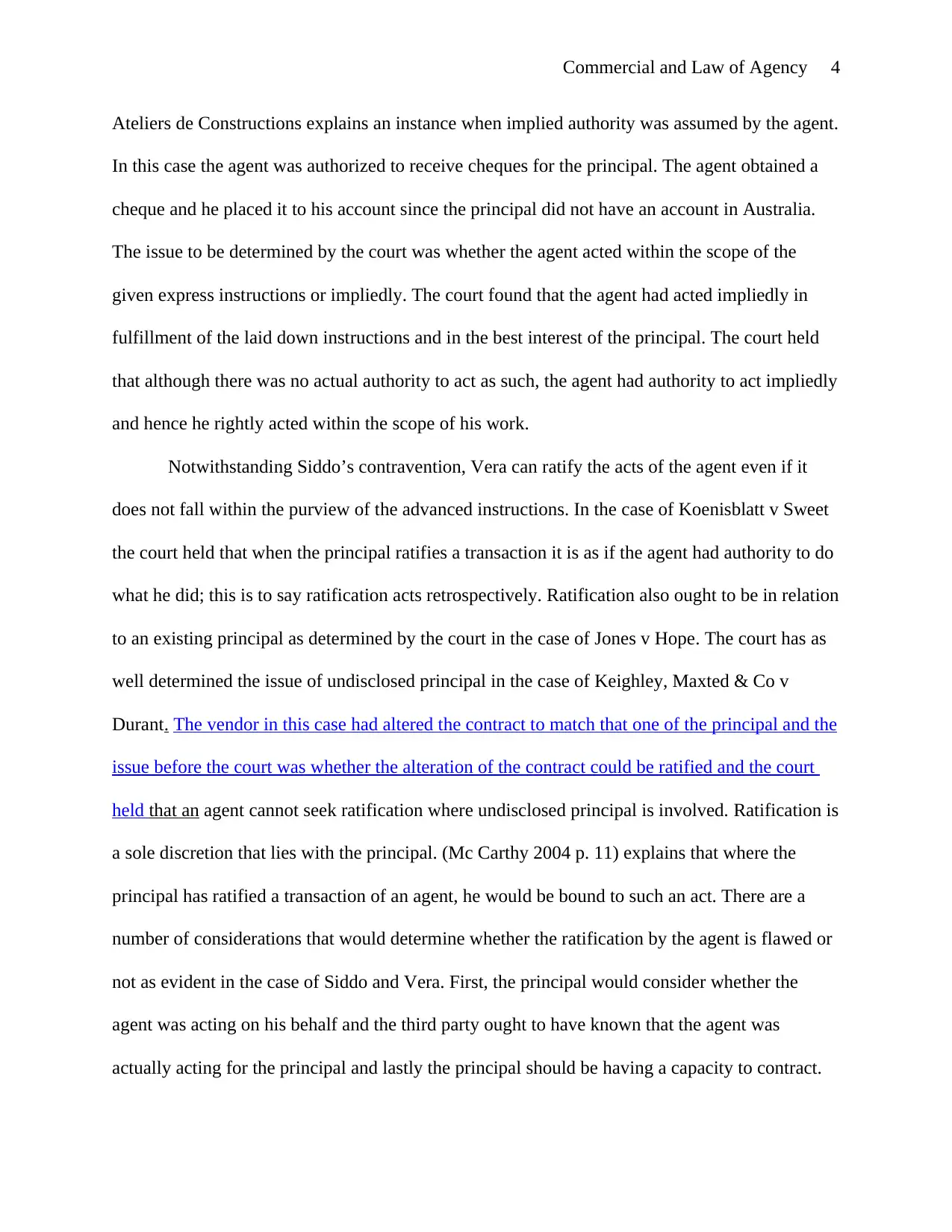
Commercial and Law of Agency 4
Ateliers de Constructions explains an instance when implied authority was assumed by the agent.
In this case the agent was authorized to receive cheques for the principal. The agent obtained a
cheque and he placed it to his account since the principal did not have an account in Australia.
The issue to be determined by the court was whether the agent acted within the scope of the
given express instructions or impliedly. The court found that the agent had acted impliedly in
fulfillment of the laid down instructions and in the best interest of the principal. The court held
that although there was no actual authority to act as such, the agent had authority to act impliedly
and hence he rightly acted within the scope of his work.
Notwithstanding Siddo’s contravention, Vera can ratify the acts of the agent even if it
does not fall within the purview of the advanced instructions. In the case of Koenisblatt v Sweet
the court held that when the principal ratifies a transaction it is as if the agent had authority to do
what he did; this is to say ratification acts retrospectively. Ratification also ought to be in relation
to an existing principal as determined by the court in the case of Jones v Hope. The court has as
well determined the issue of undisclosed principal in the case of Keighley, Maxted & Co v
Durant. The vendor in this case had altered the contract to match that one of the principal and the
issue before the court was whether the alteration of the contract could be ratified and the court
held that an agent cannot seek ratification where undisclosed principal is involved. Ratification is
a sole discretion that lies with the principal. (Mc Carthy 2004 p. 11) explains that where the
principal has ratified a transaction of an agent, he would be bound to such an act. There are a
number of considerations that would determine whether the ratification by the agent is flawed or
not as evident in the case of Siddo and Vera. First, the principal would consider whether the
agent was acting on his behalf and the third party ought to have known that the agent was
actually acting for the principal and lastly the principal should be having a capacity to contract.
Ateliers de Constructions explains an instance when implied authority was assumed by the agent.
In this case the agent was authorized to receive cheques for the principal. The agent obtained a
cheque and he placed it to his account since the principal did not have an account in Australia.
The issue to be determined by the court was whether the agent acted within the scope of the
given express instructions or impliedly. The court found that the agent had acted impliedly in
fulfillment of the laid down instructions and in the best interest of the principal. The court held
that although there was no actual authority to act as such, the agent had authority to act impliedly
and hence he rightly acted within the scope of his work.
Notwithstanding Siddo’s contravention, Vera can ratify the acts of the agent even if it
does not fall within the purview of the advanced instructions. In the case of Koenisblatt v Sweet
the court held that when the principal ratifies a transaction it is as if the agent had authority to do
what he did; this is to say ratification acts retrospectively. Ratification also ought to be in relation
to an existing principal as determined by the court in the case of Jones v Hope. The court has as
well determined the issue of undisclosed principal in the case of Keighley, Maxted & Co v
Durant. The vendor in this case had altered the contract to match that one of the principal and the
issue before the court was whether the alteration of the contract could be ratified and the court
held that an agent cannot seek ratification where undisclosed principal is involved. Ratification is
a sole discretion that lies with the principal. (Mc Carthy 2004 p. 11) explains that where the
principal has ratified a transaction of an agent, he would be bound to such an act. There are a
number of considerations that would determine whether the ratification by the agent is flawed or
not as evident in the case of Siddo and Vera. First, the principal would consider whether the
agent was acting on his behalf and the third party ought to have known that the agent was
actually acting for the principal and lastly the principal should be having a capacity to contract.
Paraphrase This Document
Need a fresh take? Get an instant paraphrase of this document with our AI Paraphraser
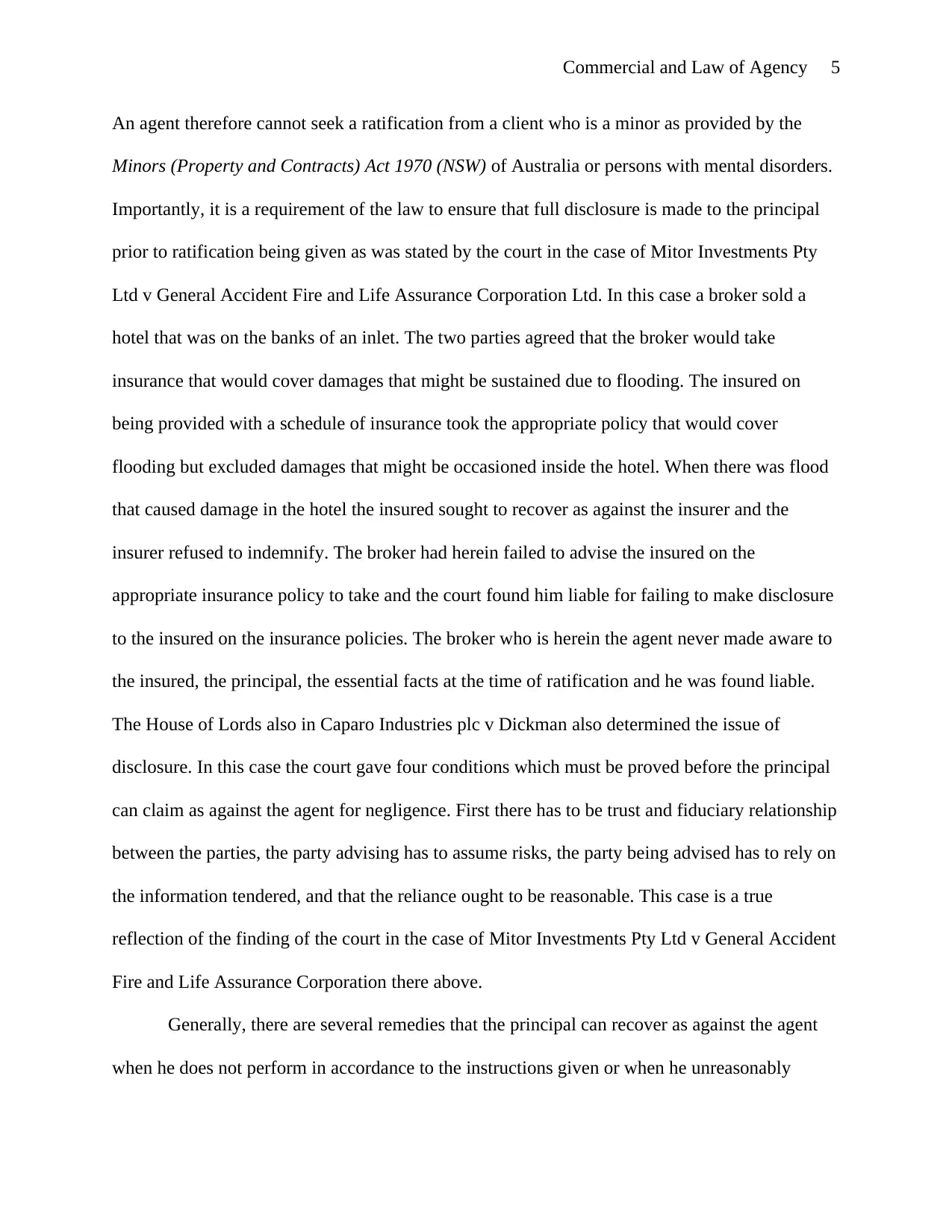
Commercial and Law of Agency 5
An agent therefore cannot seek a ratification from a client who is a minor as provided by the
Minors (Property and Contracts) Act 1970 (NSW) of Australia or persons with mental disorders.
Importantly, it is a requirement of the law to ensure that full disclosure is made to the principal
prior to ratification being given as was stated by the court in the case of Mitor Investments Pty
Ltd v General Accident Fire and Life Assurance Corporation Ltd. In this case a broker sold a
hotel that was on the banks of an inlet. The two parties agreed that the broker would take
insurance that would cover damages that might be sustained due to flooding. The insured on
being provided with a schedule of insurance took the appropriate policy that would cover
flooding but excluded damages that might be occasioned inside the hotel. When there was flood
that caused damage in the hotel the insured sought to recover as against the insurer and the
insurer refused to indemnify. The broker had herein failed to advise the insured on the
appropriate insurance policy to take and the court found him liable for failing to make disclosure
to the insured on the insurance policies. The broker who is herein the agent never made aware to
the insured, the principal, the essential facts at the time of ratification and he was found liable.
The House of Lords also in Caparo Industries plc v Dickman also determined the issue of
disclosure. In this case the court gave four conditions which must be proved before the principal
can claim as against the agent for negligence. First there has to be trust and fiduciary relationship
between the parties, the party advising has to assume risks, the party being advised has to rely on
the information tendered, and that the reliance ought to be reasonable. This case is a true
reflection of the finding of the court in the case of Mitor Investments Pty Ltd v General Accident
Fire and Life Assurance Corporation there above.
Generally, there are several remedies that the principal can recover as against the agent
when he does not perform in accordance to the instructions given or when he unreasonably
An agent therefore cannot seek a ratification from a client who is a minor as provided by the
Minors (Property and Contracts) Act 1970 (NSW) of Australia or persons with mental disorders.
Importantly, it is a requirement of the law to ensure that full disclosure is made to the principal
prior to ratification being given as was stated by the court in the case of Mitor Investments Pty
Ltd v General Accident Fire and Life Assurance Corporation Ltd. In this case a broker sold a
hotel that was on the banks of an inlet. The two parties agreed that the broker would take
insurance that would cover damages that might be sustained due to flooding. The insured on
being provided with a schedule of insurance took the appropriate policy that would cover
flooding but excluded damages that might be occasioned inside the hotel. When there was flood
that caused damage in the hotel the insured sought to recover as against the insurer and the
insurer refused to indemnify. The broker had herein failed to advise the insured on the
appropriate insurance policy to take and the court found him liable for failing to make disclosure
to the insured on the insurance policies. The broker who is herein the agent never made aware to
the insured, the principal, the essential facts at the time of ratification and he was found liable.
The House of Lords also in Caparo Industries plc v Dickman also determined the issue of
disclosure. In this case the court gave four conditions which must be proved before the principal
can claim as against the agent for negligence. First there has to be trust and fiduciary relationship
between the parties, the party advising has to assume risks, the party being advised has to rely on
the information tendered, and that the reliance ought to be reasonable. This case is a true
reflection of the finding of the court in the case of Mitor Investments Pty Ltd v General Accident
Fire and Life Assurance Corporation there above.
Generally, there are several remedies that the principal can recover as against the agent
when he does not perform in accordance to the instructions given or when he unreasonably
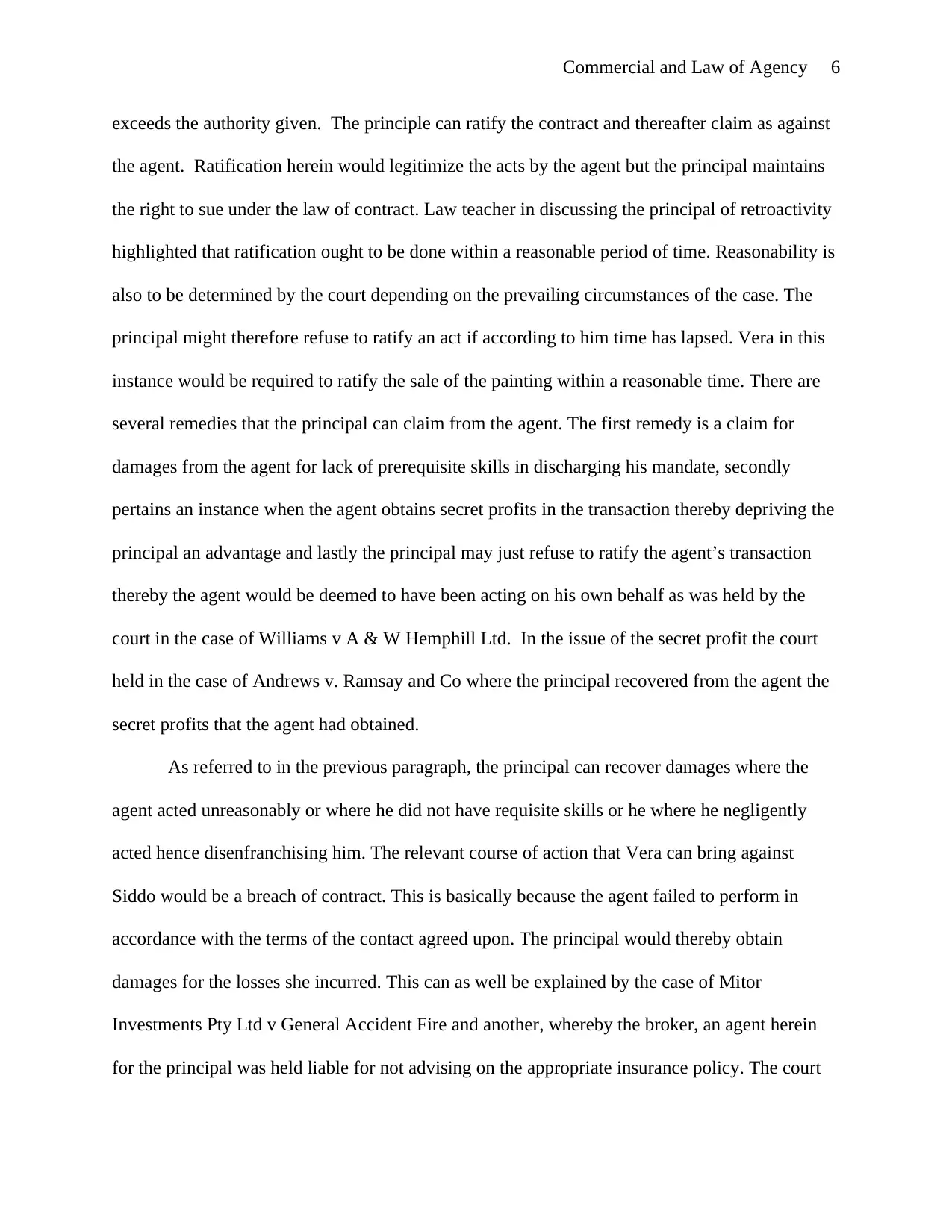
Commercial and Law of Agency 6
exceeds the authority given. The principle can ratify the contract and thereafter claim as against
the agent. Ratification herein would legitimize the acts by the agent but the principal maintains
the right to sue under the law of contract. Law teacher in discussing the principal of retroactivity
highlighted that ratification ought to be done within a reasonable period of time. Reasonability is
also to be determined by the court depending on the prevailing circumstances of the case. The
principal might therefore refuse to ratify an act if according to him time has lapsed. Vera in this
instance would be required to ratify the sale of the painting within a reasonable time. There are
several remedies that the principal can claim from the agent. The first remedy is a claim for
damages from the agent for lack of prerequisite skills in discharging his mandate, secondly
pertains an instance when the agent obtains secret profits in the transaction thereby depriving the
principal an advantage and lastly the principal may just refuse to ratify the agent’s transaction
thereby the agent would be deemed to have been acting on his own behalf as was held by the
court in the case of Williams v A & W Hemphill Ltd. In the issue of the secret profit the court
held in the case of Andrews v. Ramsay and Co where the principal recovered from the agent the
secret profits that the agent had obtained.
As referred to in the previous paragraph, the principal can recover damages where the
agent acted unreasonably or where he did not have requisite skills or he where he negligently
acted hence disenfranchising him. The relevant course of action that Vera can bring against
Siddo would be a breach of contract. This is basically because the agent failed to perform in
accordance with the terms of the contact agreed upon. The principal would thereby obtain
damages for the losses she incurred. This can as well be explained by the case of Mitor
Investments Pty Ltd v General Accident Fire and another, whereby the broker, an agent herein
for the principal was held liable for not advising on the appropriate insurance policy. The court
exceeds the authority given. The principle can ratify the contract and thereafter claim as against
the agent. Ratification herein would legitimize the acts by the agent but the principal maintains
the right to sue under the law of contract. Law teacher in discussing the principal of retroactivity
highlighted that ratification ought to be done within a reasonable period of time. Reasonability is
also to be determined by the court depending on the prevailing circumstances of the case. The
principal might therefore refuse to ratify an act if according to him time has lapsed. Vera in this
instance would be required to ratify the sale of the painting within a reasonable time. There are
several remedies that the principal can claim from the agent. The first remedy is a claim for
damages from the agent for lack of prerequisite skills in discharging his mandate, secondly
pertains an instance when the agent obtains secret profits in the transaction thereby depriving the
principal an advantage and lastly the principal may just refuse to ratify the agent’s transaction
thereby the agent would be deemed to have been acting on his own behalf as was held by the
court in the case of Williams v A & W Hemphill Ltd. In the issue of the secret profit the court
held in the case of Andrews v. Ramsay and Co where the principal recovered from the agent the
secret profits that the agent had obtained.
As referred to in the previous paragraph, the principal can recover damages where the
agent acted unreasonably or where he did not have requisite skills or he where he negligently
acted hence disenfranchising him. The relevant course of action that Vera can bring against
Siddo would be a breach of contract. This is basically because the agent failed to perform in
accordance with the terms of the contact agreed upon. The principal would thereby obtain
damages for the losses she incurred. This can as well be explained by the case of Mitor
Investments Pty Ltd v General Accident Fire and another, whereby the broker, an agent herein
for the principal was held liable for not advising on the appropriate insurance policy. The court
⊘ This is a preview!⊘
Do you want full access?
Subscribe today to unlock all pages.

Trusted by 1+ million students worldwide
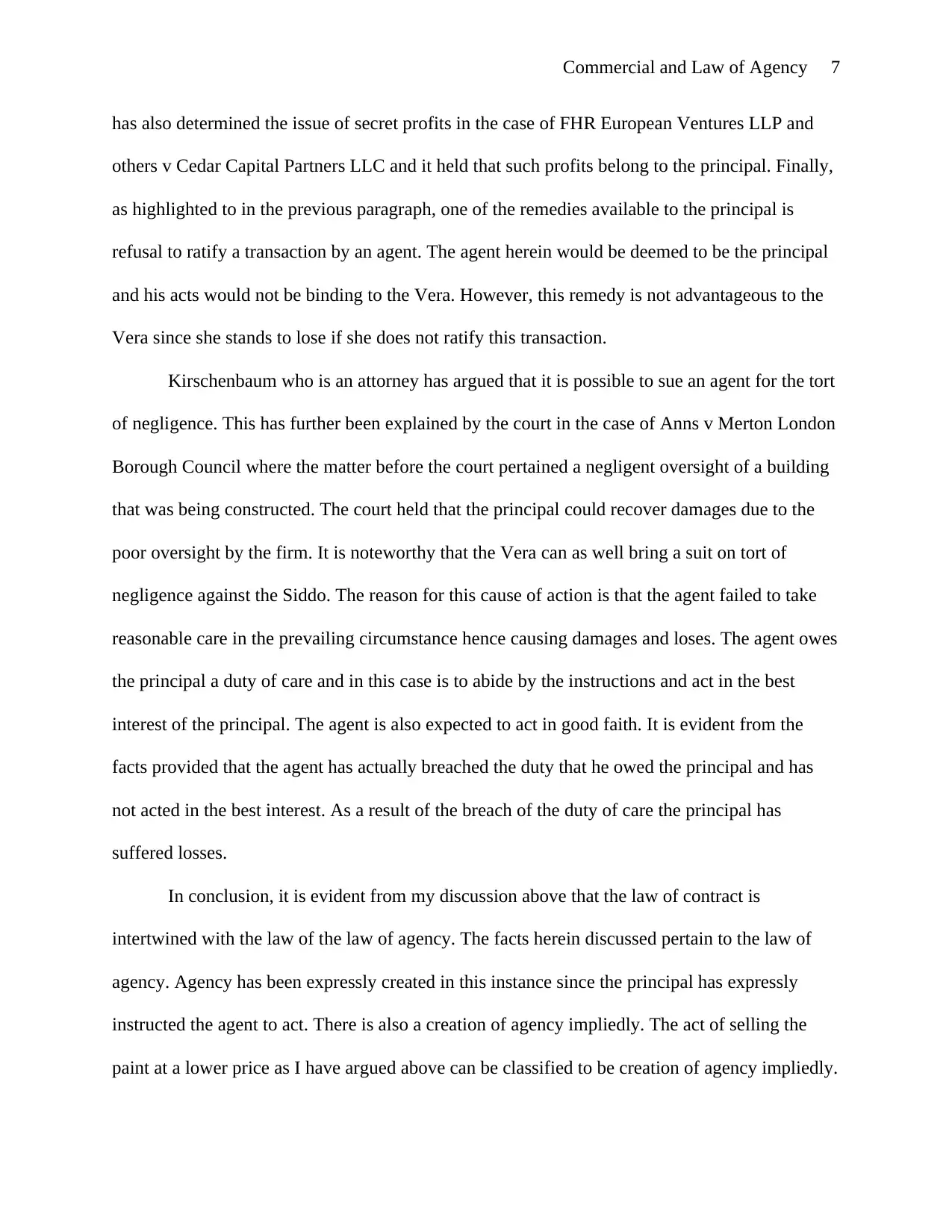
Commercial and Law of Agency 7
has also determined the issue of secret profits in the case of FHR European Ventures LLP and
others v Cedar Capital Partners LLC and it held that such profits belong to the principal. Finally,
as highlighted to in the previous paragraph, one of the remedies available to the principal is
refusal to ratify a transaction by an agent. The agent herein would be deemed to be the principal
and his acts would not be binding to the Vera. However, this remedy is not advantageous to the
Vera since she stands to lose if she does not ratify this transaction.
Kirschenbaum who is an attorney has argued that it is possible to sue an agent for the tort
of negligence. This has further been explained by the court in the case of Anns v Merton London
Borough Council where the matter before the court pertained a negligent oversight of a building
that was being constructed. The court held that the principal could recover damages due to the
poor oversight by the firm. It is noteworthy that the Vera can as well bring a suit on tort of
negligence against the Siddo. The reason for this cause of action is that the agent failed to take
reasonable care in the prevailing circumstance hence causing damages and loses. The agent owes
the principal a duty of care and in this case is to abide by the instructions and act in the best
interest of the principal. The agent is also expected to act in good faith. It is evident from the
facts provided that the agent has actually breached the duty that he owed the principal and has
not acted in the best interest. As a result of the breach of the duty of care the principal has
suffered losses.
In conclusion, it is evident from my discussion above that the law of contract is
intertwined with the law of the law of agency. The facts herein discussed pertain to the law of
agency. Agency has been expressly created in this instance since the principal has expressly
instructed the agent to act. There is also a creation of agency impliedly. The act of selling the
paint at a lower price as I have argued above can be classified to be creation of agency impliedly.
has also determined the issue of secret profits in the case of FHR European Ventures LLP and
others v Cedar Capital Partners LLC and it held that such profits belong to the principal. Finally,
as highlighted to in the previous paragraph, one of the remedies available to the principal is
refusal to ratify a transaction by an agent. The agent herein would be deemed to be the principal
and his acts would not be binding to the Vera. However, this remedy is not advantageous to the
Vera since she stands to lose if she does not ratify this transaction.
Kirschenbaum who is an attorney has argued that it is possible to sue an agent for the tort
of negligence. This has further been explained by the court in the case of Anns v Merton London
Borough Council where the matter before the court pertained a negligent oversight of a building
that was being constructed. The court held that the principal could recover damages due to the
poor oversight by the firm. It is noteworthy that the Vera can as well bring a suit on tort of
negligence against the Siddo. The reason for this cause of action is that the agent failed to take
reasonable care in the prevailing circumstance hence causing damages and loses. The agent owes
the principal a duty of care and in this case is to abide by the instructions and act in the best
interest of the principal. The agent is also expected to act in good faith. It is evident from the
facts provided that the agent has actually breached the duty that he owed the principal and has
not acted in the best interest. As a result of the breach of the duty of care the principal has
suffered losses.
In conclusion, it is evident from my discussion above that the law of contract is
intertwined with the law of the law of agency. The facts herein discussed pertain to the law of
agency. Agency has been expressly created in this instance since the principal has expressly
instructed the agent to act. There is also a creation of agency impliedly. The act of selling the
paint at a lower price as I have argued above can be classified to be creation of agency impliedly.
Paraphrase This Document
Need a fresh take? Get an instant paraphrase of this document with our AI Paraphraser
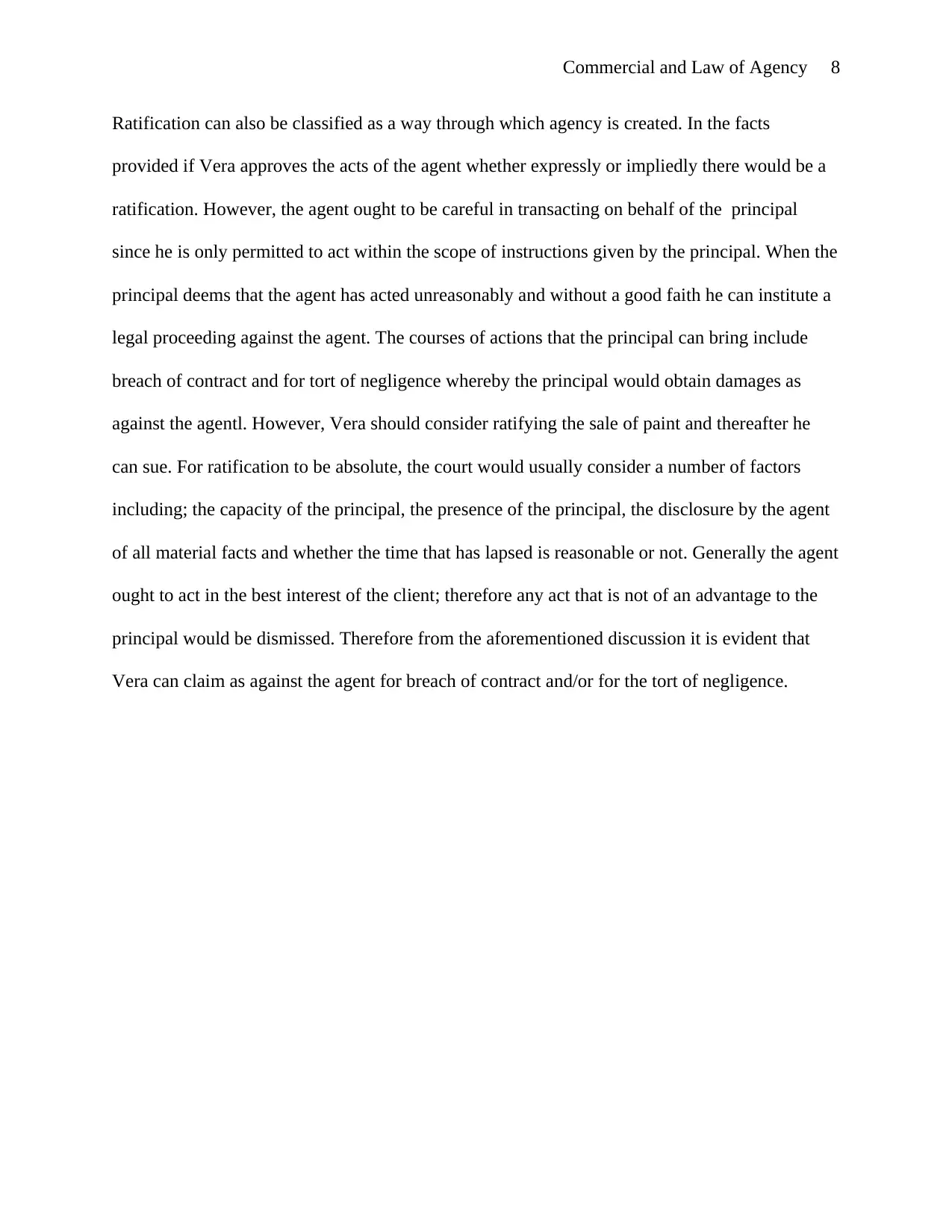
Commercial and Law of Agency 8
Ratification can also be classified as a way through which agency is created. In the facts
provided if Vera approves the acts of the agent whether expressly or impliedly there would be a
ratification. However, the agent ought to be careful in transacting on behalf of the principal
since he is only permitted to act within the scope of instructions given by the principal. When the
principal deems that the agent has acted unreasonably and without a good faith he can institute a
legal proceeding against the agent. The courses of actions that the principal can bring include
breach of contract and for tort of negligence whereby the principal would obtain damages as
against the agentl. However, Vera should consider ratifying the sale of paint and thereafter he
can sue. For ratification to be absolute, the court would usually consider a number of factors
including; the capacity of the principal, the presence of the principal, the disclosure by the agent
of all material facts and whether the time that has lapsed is reasonable or not. Generally the agent
ought to act in the best interest of the client; therefore any act that is not of an advantage to the
principal would be dismissed. Therefore from the aforementioned discussion it is evident that
Vera can claim as against the agent for breach of contract and/or for the tort of negligence.
Ratification can also be classified as a way through which agency is created. In the facts
provided if Vera approves the acts of the agent whether expressly or impliedly there would be a
ratification. However, the agent ought to be careful in transacting on behalf of the principal
since he is only permitted to act within the scope of instructions given by the principal. When the
principal deems that the agent has acted unreasonably and without a good faith he can institute a
legal proceeding against the agent. The courses of actions that the principal can bring include
breach of contract and for tort of negligence whereby the principal would obtain damages as
against the agentl. However, Vera should consider ratifying the sale of paint and thereafter he
can sue. For ratification to be absolute, the court would usually consider a number of factors
including; the capacity of the principal, the presence of the principal, the disclosure by the agent
of all material facts and whether the time that has lapsed is reasonable or not. Generally the agent
ought to act in the best interest of the client; therefore any act that is not of an advantage to the
principal would be dismissed. Therefore from the aforementioned discussion it is evident that
Vera can claim as against the agent for breach of contract and/or for the tort of negligence.
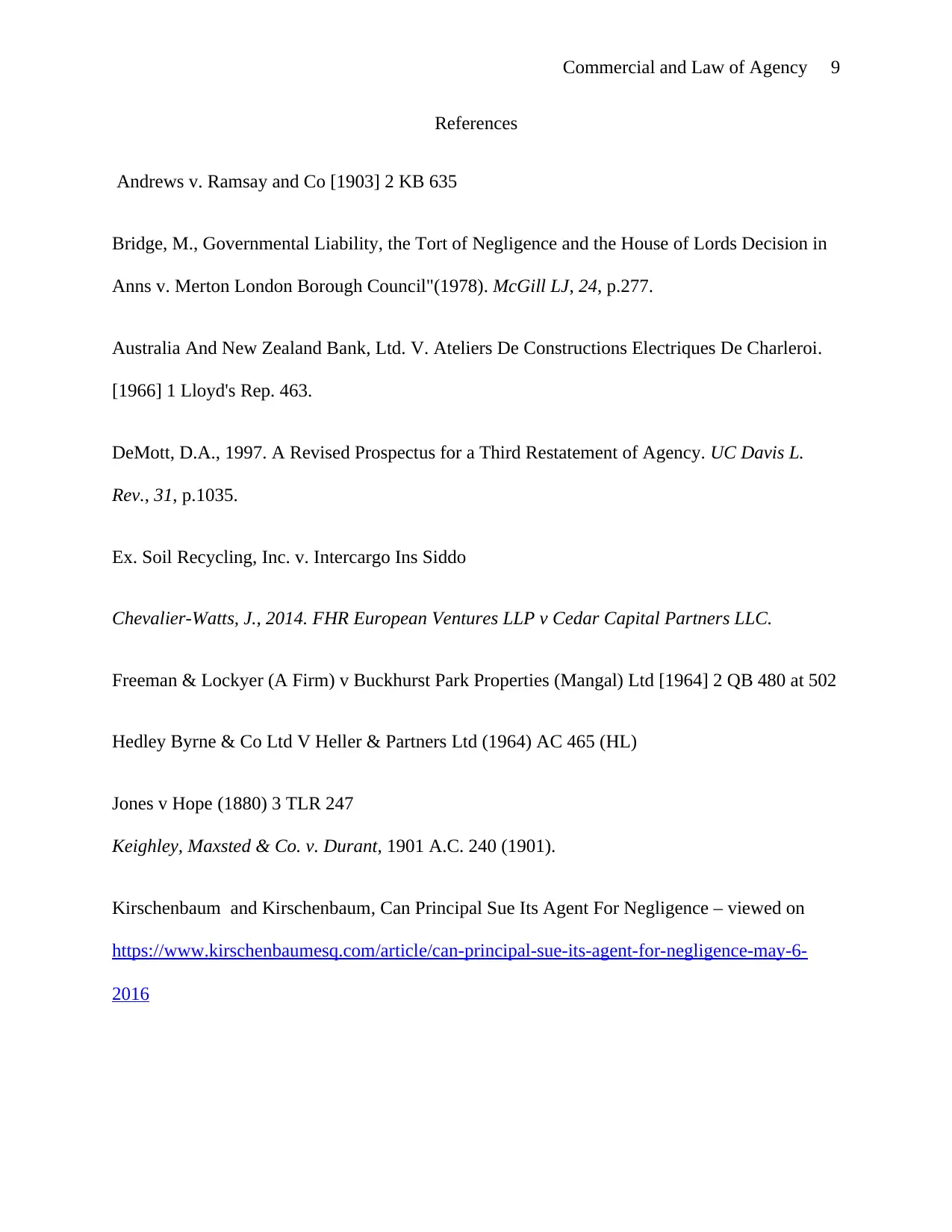
Commercial and Law of Agency 9
References
Andrews v. Ramsay and Co [1903] 2 KB 635
Bridge, M., Governmental Liability, the Tort of Negligence and the House of Lords Decision in
Anns v. Merton London Borough Council"(1978). McGill LJ, 24, p.277.
Australia And New Zealand Bank, Ltd. V. Ateliers De Constructions Electriques De Charleroi.
[1966] 1 Lloyd's Rep. 463.
DeMott, D.A., 1997. A Revised Prospectus for a Third Restatement of Agency. UC Davis L.
Rev., 31, p.1035.
Ex. Soil Recycling, Inc. v. Intercargo Ins Siddo
Chevalier-Watts, J., 2014. FHR European Ventures LLP v Cedar Capital Partners LLC.
Freeman & Lockyer (A Firm) v Buckhurst Park Properties (Mangal) Ltd [1964] 2 QB 480 at 502
Hedley Byrne & Co Ltd V Heller & Partners Ltd (1964) AC 465 (HL)
Jones v Hope (1880) 3 TLR 247
Keighley, Maxsted & Co. v. Durant, 1901 A.C. 240 (1901).
Kirschenbaum and Kirschenbaum, Can Principal Sue Its Agent For Negligence – viewed on
https://www.kirschenbaumesq.com/article/can-principal-sue-its-agent-for-negligence-may-6-
2016
References
Andrews v. Ramsay and Co [1903] 2 KB 635
Bridge, M., Governmental Liability, the Tort of Negligence and the House of Lords Decision in
Anns v. Merton London Borough Council"(1978). McGill LJ, 24, p.277.
Australia And New Zealand Bank, Ltd. V. Ateliers De Constructions Electriques De Charleroi.
[1966] 1 Lloyd's Rep. 463.
DeMott, D.A., 1997. A Revised Prospectus for a Third Restatement of Agency. UC Davis L.
Rev., 31, p.1035.
Ex. Soil Recycling, Inc. v. Intercargo Ins Siddo
Chevalier-Watts, J., 2014. FHR European Ventures LLP v Cedar Capital Partners LLC.
Freeman & Lockyer (A Firm) v Buckhurst Park Properties (Mangal) Ltd [1964] 2 QB 480 at 502
Hedley Byrne & Co Ltd V Heller & Partners Ltd (1964) AC 465 (HL)
Jones v Hope (1880) 3 TLR 247
Keighley, Maxsted & Co. v. Durant, 1901 A.C. 240 (1901).
Kirschenbaum and Kirschenbaum, Can Principal Sue Its Agent For Negligence – viewed on
https://www.kirschenbaumesq.com/article/can-principal-sue-its-agent-for-negligence-may-6-
2016
⊘ This is a preview!⊘
Do you want full access?
Subscribe today to unlock all pages.

Trusted by 1+ million students worldwide
1 out of 9
Related Documents
Your All-in-One AI-Powered Toolkit for Academic Success.
+13062052269
info@desklib.com
Available 24*7 on WhatsApp / Email
![[object Object]](/_next/static/media/star-bottom.7253800d.svg)
Unlock your academic potential
Copyright © 2020–2026 A2Z Services. All Rights Reserved. Developed and managed by ZUCOL.





